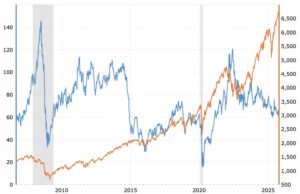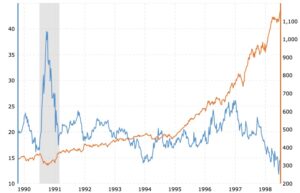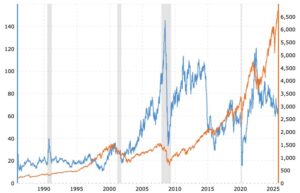“I love extremes and outliers. It’s what makes the world interesting and investing lucrative.”
I said that when I suggested that selling your metals for oil may not be a crazy idea.
And now, just a week later, I’m seeing more reasons to believe that is true.
Obviously I don’t want to get stuck in the recency bias trap. Perhaps my brain is subconsciously ignoring obvious information in favor of focusing on data that supports my bullish outlook on oil?
That could certainly by true, but to be clear I’m not specifically bullish on oil on its own. I’m bullish on oil relative to the value and trend of other stores of wealth.
It’s likely that we’re a bit early for this entire situation. I’m usually too early to most trends, which has included uranium, silver, psychedelics, longevity, and even bitcoin.
Despite my quasi-self-deprecation about economic forecasts, the Explorer Equity Fund is up double digits this year and I am now pursuing the rotational strategy which I am writing about here.
The Relative Oil Bull
The only industries I’d consider myself an expert in have to do with the ocean – mostly surfing. When it comes to almost all investing sectors, I’m more of a generalist.
Knowing that, I would never try to forecast the specific price, supply, or demand of oil. There are far too many levers – too many variables – for anyone to accurately predict the oil market in the short run. But I would make a directional bet that oil will be more expensive, in less supply, and in greater demand sometime in the near future.
This directional bet has hardly ever been wrong in any 10 year time period since oil has been a major global commodity. The combination of fiat inflation, ever increasingly difficult oil extraction, and increased demand through energy consumption almost guarantees this continued trend for at least all of our lifetimes.
The same concept, with different value drivers, could be applied to gold, real estate, art, or any other wealth preserving asset that has agreed upon value across multiple generations. Bitcoin, I would argue, has not yet been agreed upon by multiple generations.
Understanding all of this, it would be implied that there are two ways to invest in oil: hold it forever or trade the multi-year fluctuations. Since I don’t have a SPR tank in my backyard, I’ll choose the fluctuations strategy.
Oil’s Relatives
Last week I talked about how gold has completely decoupled from oil. They’ve basically divorced for now, until their eventual remarriage in the coming years.
But it’s not just the relationship between oil and gold that is interesting. US equities are also screaming something to us right now.

As you can see in the chart above, the S&P500 (orange) has resumed it’s upwards trend since Liberation Day. Meanwhile, oil (blue) has seen a gradual decline.
While the above image may not suggest any specific trend or relation, the below chart is shockingly similar.

Prior to the dot com bubble, the S&P500 and oil diverged in a strangely similar way as today’s situation. Even more interesting is that both of these diverging scenarios were preceded by a large oil price shock in the decade prior (1990 and 2008).
These two oil shocks, in 1990 and 2008, are noteworthy because this is when large capital expenditures went into oil production and infrastructure. After these periods of large capex deployment, which brings on more supply, little-to-no additional capex is deployed for many years.
Just like any boom-bust industry, low prices are the cure for low prices.
The question, based on everything above is: What happened after the divergence of oil and the S&P500 in the years after 2000?

chart sources: MacroTrends
As you can see in this historical chart, the oil rebound was quick to eventually catch up to the S&P500 before both sold off around ~2002. And then, oil went on to annihilate the performance of equities.
Of course there are plenty of, ‘but that time was different because of X, Y, and Z’ explanations. But there are also many similarities, which include:
- The underinvestment in oil/gas
- The over stretching of most equity valuations
- The timeframe in which equity valuations stretched relative to oil price stagnation
- The artificial increase and decrease of central bank rate policy
- The increase in monetary supply
And the most important aspect of all: Humans are irrational, emotional psychopaths who cannot stop chasing shiny objects. Right now, oil is not the shiny object.
The Painful Trade
As I’ve previously stated, the ‘sell everything and go into oil trade’ is not to be pursued haphazardly. Cheap oil seems to be a top priority for the current Trump administration, even if that means getting a once-sanctioned Latin American country back on line (through intimidation or brute force).
But even if a country with some of the world’s largest oil reserves reenters the global oil supply pool, there are still sectors within the petroleum industry that are interesting. The services, pipelines, refineries, transporters, chemicals, and equipment that are vital to turning dinosaur bones into fuel are incredibly inexpensive right now… relative to everything else.




